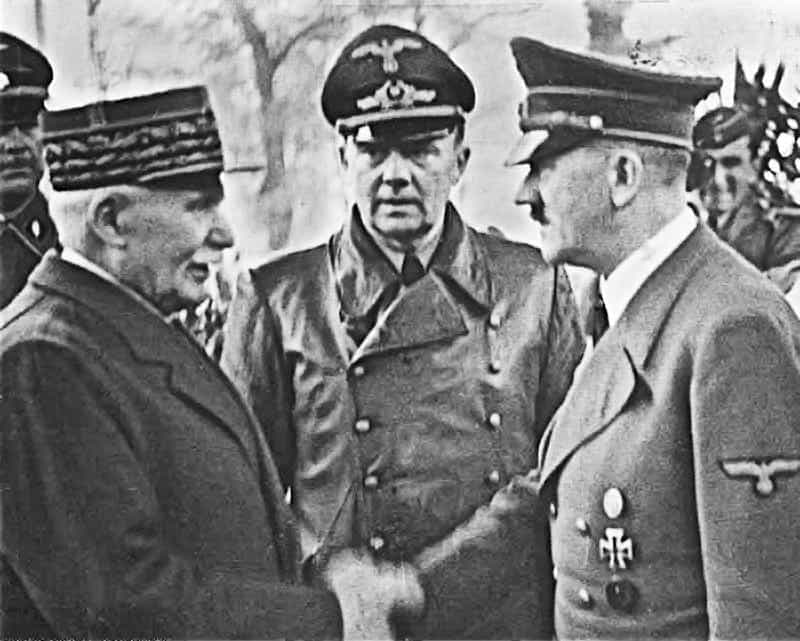
Marshall Phillipe Pétain, left, shakes hands with Adolf Hitler. Pétain praised German forces for repelling the Allied attack on the French port of Dieppe. President Roosevelt was furious at all citizens of allied nations who aided the Germans. Credit: clipart.com
By: Phil Kohn. Dedicated to the memory of his father, GM3 Walter Kohn, U.S. Navy Armed Guard, USNR, and all men and women who have answered the country’s call in time of need. Phil can be contacted at ww2remembered@yahoo.com
Marshal Philippe Pétain, head of the Vichy French government, on August 21, 1942, praises German forces for repelling the Allied attack on the French port of Dieppe. President Roosevelt says the perpetrators of barbarism in occupied countries “will have to stand in courts of law, in the very countries which they are now oppressing, and answer for their acts.” U.S. Marines repulse the first major Japanese land offensive on Guadalcanal at the Battle of the Tenaru River. Some 765 (85%) of the 900 Japanese attackers are killed, at a cost of around 43 Marine lives.
Under heavy pressure from the U.S., Brazil declares war on Germany and Italy on August 22. Also tipping the scales on the Brazilian decision are attacks made by German submarine U-507 in Brazilian waters that have killed over 600 people from neutral countries inside of a week. Japan is excluded from Brazil’s declaration of war. In Europe, stiff resistance by the Red Army slows the German advance into the Caucasus.
On August 23, Hitler orders that Stalingrad be captured. The Luftwaffe begins a 48-hour-long air raid there that involves over 4,000 sorties with incendiaries and explosives. The city erupts into a sea of fire as oil-storage tanks pour their flaming contents into the Volga River that flows for some 25 miles through the city. Over 40,000 civilians perish in the attack, as the city is reduced to rubble. The German 6th Army punches a five-mile-wide gap in the Soviet 62nd Army’s defenses as the 14th Panzer Corps crosses the Don River and reaches the Volga, north of Stalingrad. Hoth’s 4th Panzer Army is held up by stiff Red Army resistance south of Stalingrad. The Germans make further progress on the Kuban Peninsula on the Black Sea. A German platoon hoists the swastika flag on the top of Mt. Elbrus, the highest peak in the Caucasus.
The Naval Battle of the Eastern Solomon Islands takes place on August 24. The American aircraft carrier USS Enterprise is badly damaged; the Japanese lose one light carrier. To alleviate a labor shortage because of American farm workers going off to war, the U.S. and Mexico formally agree to permit Mexican temporary laborers to work on U.S. farms in every U.S. state. An exception is Texas, where Mexican authorities are concerned about discrimination. Some 200,000 Mexican braceros (manual laborers) will work in the U.S. during the war. The German Sixth Army moves into the northern suburbs of Stalingrad. A thousand miles to the north, Soviet forces launch a major offensive in the Leningrad area. In Germany, Hitler appoints Otto Georg Thierack as Reich Minister of Justice and gives him the power to set aside any and all laws.
On August 25, the Swedish ship SS Gripsholm arrives in New York, carrying 287 Allied officials, missionaries, correspondents and teachers who have been exchanged for Japanese diplomats. Among them is America’s longtime ambassador to Japan, Joseph Grew. Grew issues a statement describing the treatment that the ship’s passengers had endured while interned in Japan, many “in solitary confinement in small, bitterly cold prison cells, inadequately clothed and inadequately fed and at times subjected to the most cruel and barbaric tortures.” In the Soviet Union, the city of Stalingrad is declared to be in a state of siege. Efforts are made to evacuate some citizens.
On August 26, two thousand Japanese troops accompanied by small tanks land at Milne Bay, on the tip of New Guinea, southeast of Port Moresby. Their goal is to capture Allied airfields there and then move on toward Port Moresby. In Europe, the Soviet Air Force launches raids over Berlin and other German cities. Meanwhile, German Army Group B moves closer to its target of the oilfields of Grozny, in the Caucasus. The Times of London publishes an article describing a new antibiotic drug called penicillin, discovered in 1928 by Alexander Fleming and developed at Oxford University.
The Red Army on August 27 launches counterattacks from the Leningrad pocket. At the same time some 440 miles to the southeast, the Red Army’s offensive on the Moscow front continues. Gen. Georgy Zhukov is appointed Stalin’s First Deputy Commissar for Defense. In France, the Vichy government begins cooperating with German authorities to “deport” Jews to Auschwitz, in Occupied Poland. Cuba declares war on Germany, Italy and Japan.







